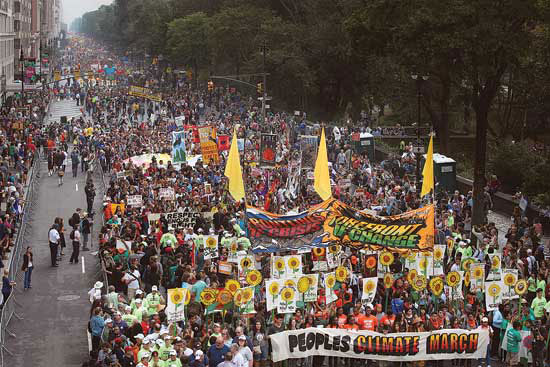Money is shifting away from coal, oil and gas thanks to a growing coalition that’s pressuring universities and other prominent institutions to divest from fossil fuels.
Even the heirs of John D. Rockefeller — a man who built a vast fortune on oil — are divesting fossil fuels from the family’s philanthropic organization, the Rockefeller Brothers Fund. To date, dozens of foundations and institutions (including the British Medical Association and the Sierra Club), hundreds of churches, 30-some municipalities (including Madison, Wis., San Francisco and Seattle), and at least a dozen colleges and universities (including Stanford University) have decided to divest funds they once held in the fossil fuel industry. Boycotts have worked to spur sweeping social change before, and today’s fossil fuel divestment organizers hope to be as successful as the divestment campaign that played a key role in overturning apartheid in South Africa.
Are these seemingly big moves having a big impact? “I would say it’s absolutely working,” says Jay Carmona, national divestment campaign manager with 350.org, the nonprofit group leading the way on the divestment efforts. (The number 350 comes from the maximum parts per million, or ppm, of atmospheric carbon dioxide climate scientists agree will maintain our planet’s ecological health. The level is already past 400 ppm, and it’s rising by about 2 ppm each year.) “Divestment is spreading and becoming more global. Campaigns are launching in Australia and Europe, including in the Netherlands,” Carmona says.
Organizers at 350.org launched the Fossil Free project primarily on moral grounds: Investing in companies that profit from burning fossil fuels is morally wrong, they reasoned, even if such investments yield good returns for the investors. Burning coal, oil and gas releases carbon dioxide into the atmosphere, thus contributing to air pollution and climate change. “Fossil fuel companies’ profits come from the destruction of communities and the planet,” Carmona says.
Divesting isn’t just about taking a moral stand, though — it makes long-term financial sense, too. Investors can earn just as much money by shifting their investments to companies listed in the new Fossil Free Indexes, a set of resources founded by Stuart Braman, former managing director of the Risk Solutions Group at Standard & Poor (S&P). The Indexes are based on the S&P 500, but omit the largest coal, oil and gas companies identified on the Carbon Underground 200 list.
Fossil-free investing also protects portfolios from the obsolescence of fossil fuel resources, Carmona adds, given that many countries are moving to reduce pollution and slow climate change by taxing the burning of fossil fuels — a way to make oil and gas companies pay for the true costs of their business.
The Risky Business Project, co-founded by climate activists and government players, published a report in June 2014 called “A Climate Risk Assessment for the United States.” According to the report, continuing on our current, fossil fuel-dependent path will have grave effects on people and the economy: rising sea levels, agricultural disruption, and risks to labor productivity and human health.
This warning is echoed by the Third National Climate Assessment, the authoritative and comprehensive report on climate change and its impacts in the United States, released in May by the U.S. Global Change Research Program. The good news? The report says we can still reduce these risks by aggressively adapting to climate change and reducing carbon emissions.
The fossil fuel industry has “five times as much carbon in its reserves as it would take to break the planet,” wrote Bill McKibben in Rolling Stone in his open invitation to attend a massive climate demonstration in New York City in September 2014, which coincided with the U.N.’s Climate Summit. Keeping that carbon out of the atmosphere was paramount for the 400,000 people from around the world who marched through the city.
“I think it signifies new territory,” Carmona says of the diverse coalition that came together for the march. “It’s just the beginning.”
